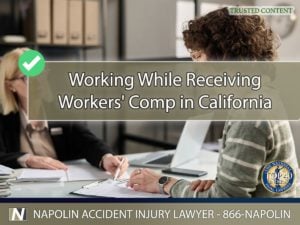Working While Receiving Workers’ Comp in California
Workers’ compensation in California provides a vital support system for employees incapacitated by injuries or illnesses due to workplace incidents. This program ensures that affected workers receive medical care and compensation for lost wages. For many, the possibility of working during this period poses questions about legality and rights under state law. This article aims to demystify the conditions under which injured workers may engage in employment while receiving workers’ compensation benefits and to outline the critical role of both employer accommodations and legal guidance.
Eligibility for Workers’ Compensation in California
To qualify for workers’ compensation in California, an employee must experience an injury or illness directly related to their job duties or workplace environment. The program is designed to replace a portion of the injured employee’s income while they recover and to cover all related medical expenses. Immediate reporting of the injury to the employer is crucial, as delays can complicate the claims process. Employees are generally eligible from their first day of employment, and there are no minimum earnings requirements. Understanding these prerequisites is the first step toward leveraging the benefits appropriately.

Working While on Workers’ Compensation
Working While on Workers’ Compensation
In California, working while on workers’ compensation is permissible under specific conditions that do not aggravate the injury and are approved by the treating physician. If a worker can perform their job duties in a limited or modified capacity, they may continue to work without forfeiting their compensation benefits. These arrangements require clear communication between the worker, their healthcare provider, and their employer to ensure that the work activities are safe and within the medical restrictions prescribed. It is essential to document any agreements about modified work duties to protect both the employee’s health and their rights to benefits.
Employer’s Role and Responsibilities Under California Workers’ Comp Laws
Employers have significant responsibilities under California workers’ compensation laws, including providing modified work that accommodates an injured employee’s restrictions. Failure to do so can lead to penalties and increased compensation costs. Employers must also avoid any form of retaliation against employees who claim workers’ compensation benefits. They are required to maintain accurate records of workplace injuries and to ensure that their insurance covers all employees adequately. Understanding these responsibilities can help employees ensure that they are receiving the support they are entitled to under the law.
Legal Implications of Working Another Job
Employees receiving workers’ compensation who are considering another job must evaluate how this decision could affect their benefits. California law allows injured workers to engage in other employment, provided it aligns with the medical guidelines set forth in their workers’ comp case. Earnings from another job must be reported, as they can affect the calculation of workers’ compensation benefits. It is advisable for workers to consult with their attorney before accepting additional employment to avoid any potential reduction in benefits or allegations of fraud.

Changing Jobs During Workers’ Compensation in California
Changing Jobs During Workers’ Compensation in California
Changing jobs while on workers’ compensation is permissible, but it comes with potential risks and complications. Such a decision should be made with a clear understanding of how it might impact ongoing medical treatments and benefit calculations. If a new job aligns better with a worker’s physical capabilities post-injury, it may indeed be a positive step. However, workers should discuss such changes with their legal advisor to understand any implications for their compensation benefits and overall recovery trajectory. Depending on the wage difference between the new and former position, benefits may lower or cease.
Precautions and Fraud Prevention in California Workers’ Comp
Fraudulent claims or failure to adhere to prescribed medical guidelines can lead to severe penalties, including the termination of benefits and legal prosecution. California actively investigates workers’ compensation fraud, which can include working in a capacity that is inconsistent with medical restrictions or failing to report income while receiving benefits. Workers must ensure that all employment activities while on workers’ comp are transparent and within legal and medical guidelines to avoid these risks.
Seeking Legal Help for Your Work Injury
Consulting with an experienced workers’ compensation lawyer is crucial for navigating the complexities of your claim and ensuring that your rights are protected throughout the process. A lawyer can help interpret the laws, provide guidance on documentation and compliance, and represent your interests in disputes or negotiations. Whether you are filing a new claim, challenging a denial, or facing issues with your employer, legal support can be invaluable in securing the full benefits you are entitled to.

Working While Receiving Workers’ Comp in California
Working While Receiving Workers’ Comp in California
Understanding your rights and obligations under California’s workers’ compensation laws is essential for any worker navigating an injury or illness. If you find yourself unsure of your rights or if you need help managing the intricacies of your workers’ compensation claim, do not hesitate to seek professional legal help. Contact Napolin Accident Injury Lawyer at (866)-NAPOLIN for a free consultation. Our dedicated team is ready to assist you with your claim, helping you to secure the benefits you need to recover and return to work safely.
- Medical Liens in California Personal Injury Claims Explained - April 27, 2024
- Essential Tips for Bicycle Injury Prevention in California - April 27, 2024
- Understanding Who is Exempt from Workers’ Compensation in California - April 27, 2024
